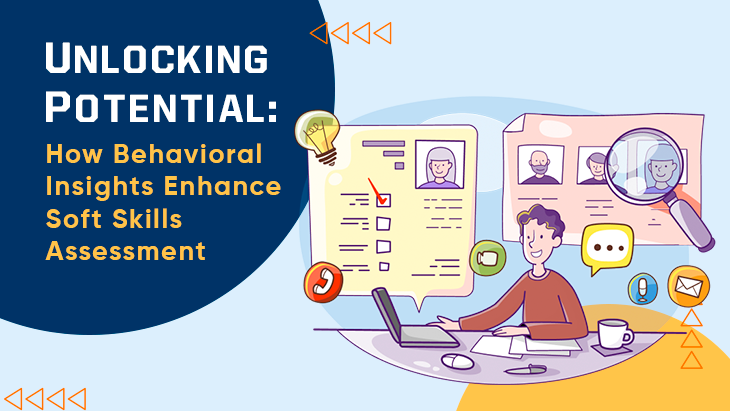The importance of soft skills such as communication, flexibility, problem-solving, and teamwork in today’s workplace cannot be overstated. These skills, often called "people skills" or "interpersonal skills," are critical to individual success and overall organizational effectiveness. However, assessing soft skills has traditionally been challenging due to their subjective nature. Enter TalentGenie, a powerful platform utilizing Behavioral Vision, which promises to transform how we measure and acquire these critical skills, ensuring that both employers and job seekers can thrive in the modern workplace.
Understanding Soft Skills and Their Importance
Soft skills are those non-technical abilities that enable a person to interact effectively with others. Unlike hard skills, which are specific, learnable abilities (such as law or mathematics), soft skills are more about how a person behaves, communicates and cooperates They include.
-
Communication: The skill of expressing information in a clear and effective manner.
-
Teamwork: Ability to work well with others, often in a team setting.
-
Adaptability: The ability to adapt to new or changing circumstances.
-
Problem Solving: Ability to identify issues and develop solutions.
-
Emotional intelligence: The ability to recognize and regulate your own emotions and those of others.
These skills are becoming increasingly valuable in Talent Genie fast-paced, collaborative work environment. They are essential to building strong teams, driving innovation, and ensuring smooth communication within and outside the organisation. According to a LinkedIn survey, 92% of talent managers say soft skills are just as essential as hard skills, if not more so.
The Challenge of Assessing Soft Skills
Despite their importance, soft skills have traditionally been complex to assess accurately. Soft skills are highly subjective and context-dependent, unlike hard skills, which can be measured through tests, certifications, or measurables. Traditional interview or introspection research methods tend to fail because they rely heavily on individual or respondent perspectives.
This topic can be biased and unfair. For example, a candidate may overestimate their communication abilities in a self-assessment or fail to demonstrate their teamwork skills in a one-on-one interview. Similarly, cultural and linguistic differences can affect how certain behaviours are interpreted, creating additional research challenges.
Enter Behavioral Insights
Behavioural Vision solves these challenges by taking an objective, data-intensive approach to assessing soft skills. But what exactly is behaviour recognition?
Behavioural theories combine psychology, economics, and data analysis to study human behaviour. This approach seeks understanding how individuals make decisions, interact with others, and respond to situations. By examining behaviour in the real world, behavioural insights can reveal patterns, tendencies, and underlying skills that traditional analyses may miss.
How Behavioral Insights Enhance Soft Skills Assessment
Behavioural Vision enhances soft skills assessment in several key ways:
1. Understanding context
A key advantage of using a behavioural approach is assessing soft skills in context. Traditional research is often conducted in artificial environments, such as interviews or standardised tests, which do not accurately reflect how individuals behave in real-world situations Observing and analysing behaviours and behaviours through simulation in natural settings or simulating real-world settings.
For example, instead of asking candidates to describe how to handle conflict on the job, a behavioural assessment could be a role-play exercise in which the candidate is placed in a designed conflict situation as it is inside.
2. Data-driven decision making
Behavioural insights rely on data analysis to identify patterns and trends in behaviour. This data-driven approach reduces the subjectivity and bias of traditional research. Organisations can identify behaviours most associated with success in specific functions or areas by analysing large data sets of behavioural interactions.
For example, data analysis may reveal that employees who consistently demonstrate active listening and empathy in team meetings are likelier to thrive in leadership roles. These insights can lead to targeted assessment tools for measuring these specific behaviours, leading to more accurate predictions of future performance.
3. Ongoing feedback and development
Another significant benefit of using a behavioural approach is the ability to provide ongoing feedback and development opportunities. Traditional appraisals are typically one-off events like job interviews or annual performance reviews. In contrast, behavioural techniques can continue to be used to observe and assess soft skills.
For example, digital tools and platforms can track communication patterns, collaborative efforts, and problem-solving behaviours over time. This continuous assessment allows for real-time feedback and a personalised development plan. Employees can gain actionable insights into their strengths and areas for improvement, enabling them to develop their soft skills better.
4. Reducing unconscious bias
Unconscious bias is an essential challenge in traditional soft skill research. Biases related to factors such as gender, race, and ethnicity can affect how behaviours are identified and evaluated. Behavioural insights, which focus on objective data rather than subjective judgments, can help reduce these biases.
For example, by using algorithms to analyse communication patterns in written documents, organisations can assess a candidate’s communication skills independently of appearance, accent, or other factors; they need not be affected. This approach promotes fairness and inclusiveness in the review process.
5. Customization and Personalization
Behavioural insights allow for highly customised individual assessments. Rather than relying on a one-size-fits-all approach, organisations can tailor assessments to a function, team, or personal needs. By examining the unique behaviours important for success in a particular context, organisations can develop more relevant and predictive assessments of future performance.
For example, sales may require firm persuasion and communication skills, while customer service may prioritise empathy and patience. Behavioural insights can help identify the specific behaviours that lead to success in any role, enabling more accurate assessments and better hiring decisions.
Practical Applications of Behavioral Insights in Soft Skills Assessment
Using a behavioural approach in soft skills assessment is gaining momentum in various industries. Here are a few examples of how organisations can use this approach.
Recruiting: Companies use behavioural assessments in the hiring process to assess candidates’ soft skills in real-time scenarios, such as group exercises or simulated customer interactions. This process helps identify candidates with the technical and interpersonal skills necessary to succeed in the role.
Employee Development: Organizations use continuous behavioural monitoring tools to monitor and evaluate employee performance over time. This data is used to deliver personalised training and development programs, helping employees improve their soft skills and achieve their career goals.
Leadership Coaching: Behavioral insights are used to analyse the decision-making processes, communication styles, and team interactions of high-potential leaders to identify them This data-driven approach helps organisations develop targeted leadership coaching programs on specific areas for improvement.
Challenges and Considerations
While incorporating a behavioural approach to soft skills, assessment offers many benefits, it is not without challenges. Organisations need to consider privacy, data security, and the ethical use of behavioural data. Furthermore, the accuracy and precision of algorithm-based analysis depend on the quality and diversity of the data used to train these systems.
It is also essential to recognise that although behavioural insights can enhance the assessment of soft skills, they should not entirely replace human judgment. The best approach is to combine data-driven insights with human expertise, ensuring that research is objective and contextual.
Conclusion
Behavioural strategies can change how we evaluate and acquire soft skills in the workplace. By providing an objective approach, data-driven information, and relevant insights, behavioural insights can help organisations unlock the full potential of their employees. As soft skills become increasingly important, applying behavioural thinking to research will be vital to developing an effective, inclusive, and adaptable workforce.








Leave a reply